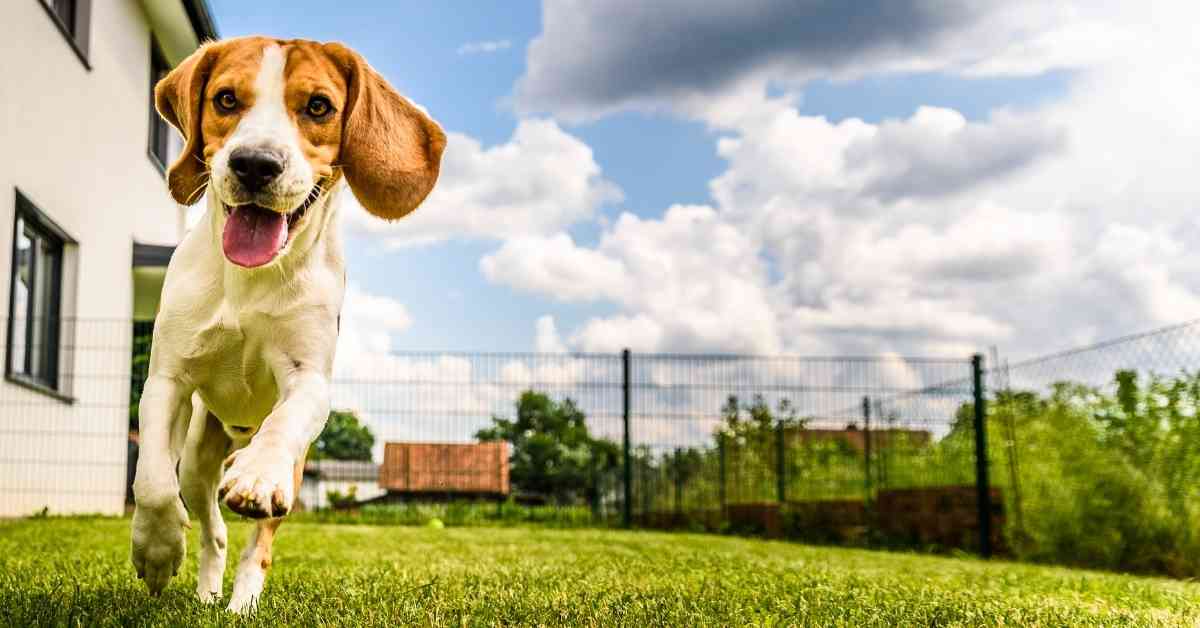Whether you already have a dog or are considering adding one to your family, you want to give them a place to play that’s safe and secure. Installing a fence around your yard can keep your pet from making a break for it, and it also minimizes distractions, such as the neighbor’s cat or a random squirrel.
When choosing a backyard dog fence, remember that not all fences are created equal. Some might be perfectly suitable for a pet-free household but won’t be ideal for a dog family. Also, some fences explicitly designed for canines may end up not being a good pick at all.
Should You Install an Invisible Fence?
Invisible fences establish boundary lines around properties. The fences consist of either a wire buried underground and extends around the property's perimeter or a wireless signal establishing a boundary around a yard. Dogs are given a collar to wear that contains a receiver. The receiver produces an electric charge if the dog steps over the boundary line.
The electric charge either produces a tone that disturbs the dog or creates a slight electric shock. The shock isn’t enough to hurt the animal; it’s merely meant to startle the dog, so they don’t continue over the fence’s boundary.
While invisible fences can help keep your pet in the yard, they aren’t the right option for every dog owner. For one thing, you may not like the idea of making your dog wear a collar that can shock them. You also don’t get the other benefits of a fence, such as privacy, from an invisible fence. Additionally, invisible fences can be difficult to install and may not work with all dogs.
A standard fence, installed by a professional fence company, is often the better option.
Top 5 Dog-Friendly Fence Features
When choosing a fence for your home, there are several features to think about, especially if you’ve got a dog. Some fence styles are more dog-friendly than others. While you may primarily be looking for a fence to create a refuge and safe play around for your pet, other benefits include increased privacy, better curb appeal, and a secure area for children.
Look for the following features when installing or replacing a fence.
1. Sturdy Materials
Whether you have a Yorkshire Terrier or a Great Dane, you want a fence that can stand up to your dog. Some fence materials are more resilient than others or better suited to withstand wear and tear or the weight of a dog eager to burst through. A vinyl fence may be a great option, as vinyl is a durable yet easy-to-care-for material. An aluminum fence can also be a good fit, as the metal is rust-proof and has a long life span.
While both types of materials are hard-wearing and generally low maintenance, there are some distinct differences between aluminum and vinyl fences. A vinyl fence typically has closely spaced pickets, making it a better pick if you are concerned about privacy around your property or a small, slimmer dog who could slip through pickets.
2. Decent Height
Some dogs are jumpers and can easily scale a short fence. If you’ve got a larger dog or know that your pet likes to jump, you need to choose a fence that’s tall enough to keep it contained. A 6-foot fence could be ideal.
Keep your town’s local laws in mind when picking your fence height. In Indianapolis, a 6-foot fence is permitted in the backyard but not in the front.
3. Adequate Depth
If your dog has a reputation for digging, you may be concerned with them escaping under the fence rather than over it. One way to outsmart an escape artist pet is to ensure the fence you install is deep enough. You may need to ask the fence company to set the fence at least 1 foot deep in the soil.
4. Closely Spaced Pickets
The pickets are the vertical posts that make up most of the fence. Some fences have pickets right next to each other, creating a solid wall ideal for privacy. Closely spaced pickets can also be a good pick if your dog’s a barker. When there’s a solid fence between your pet and the outside world, they’re less likely to bark at every passing car, squirrel, cat, or person.
5. Ease of Maintenance
One last thing to consider when choosing a fence for your dog and yard is its ease of maintenance. Vinyl and aluminum are both relatively stress-free materials. Neither will rot, and both are made to last for decades. You may need to wash the fence occasionally, but you shouldn’t have to worry about making extensive repairs or replacing sections regularly.
The team at HOA Affordable Fence Company wants to help you choose a fence that’s perfect for every member of your family. Contact us today to learn more about our fence options and the installation process.



